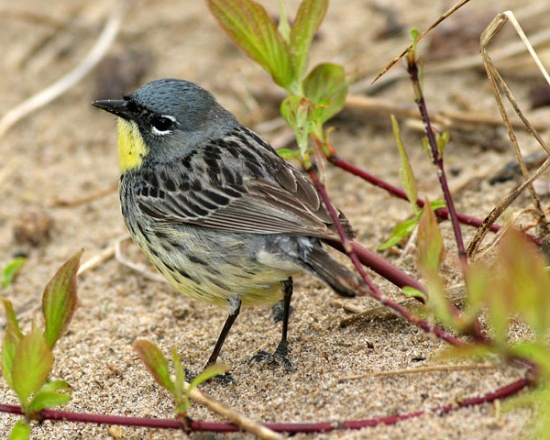JohnN-1520 (talk | contribs) |
(add link, specify distribution and habitat) |
||
| Line 1: | Line 1: | ||
[[category:incomplete]] | [[category:incomplete]] | ||
;Dendroica kirtlandii | ;Dendroica kirtlandii | ||
| − | [[Image:Kirtlands_Warbler.jpg|thumb|550px|right|Photo by kegressy <br/> | + | [[Image:Kirtlands_Warbler.jpg|thumb|550px|right|Photo by kegressy.<br/>Photo taken: Point Pelee National Park, [[Ontario]].]] |
==Identification== | ==Identification== | ||
4.75 inches Thin, pointed bill, broken eye ring, grey nape and upperparts, yellow throat, breast and belly, white undertail coverts, streaked sides and flanks, dull white wing bars, dark legs | 4.75 inches Thin, pointed bill, broken eye ring, grey nape and upperparts, yellow throat, breast and belly, white undertail coverts, streaked sides and flanks, dull white wing bars, dark legs | ||
==Distribution== | ==Distribution== | ||
| − | [[United States]] | + | Nests primarily in the northern Lower Peninsula of [[Michigan]]. In 2007 the species was found nesting in nearby areas of [[Wisconsin]] and [[Ontario]], Canada. Migrates across the southeastern [[United States]] to its wintering grounds in the [[Bahamas]]. |
==Taxonomy== | ==Taxonomy== | ||
==Habitat== | ==Habitat== | ||
| + | Jack pine forest. | ||
| + | |||
==Behaviour== | ==Behaviour== | ||
Its nests generally are concealed in mixed vegetation of grasses and shrubs, lined with moss and built by the female. 4-5 cream eggs are laid, and are incubated for 13-16 days. | Its nests generally are concealed in mixed vegetation of grasses and shrubs, lined with moss and built by the female. 4-5 cream eggs are laid, and are incubated for 13-16 days. | ||
The diet of the warbler includes many different insect species at various developmental stages, including caterpillars, butterflies, moths, flies, grasshoppers, as well as ripe blueberries. | The diet of the warbler includes many different insect species at various developmental stages, including caterpillars, butterflies, moths, flies, grasshoppers, as well as ripe blueberries. | ||
| − | |||
==External Links== | ==External Links== | ||
| + | *[http://www.birdlife.org/news/news/2007/11/kirtlands_nest_discovery.html BirdLife International: Conservationists "thrilled" as Kirtland's Warbler returns to Canada] | ||
{{GSearch|Dendroica+kirtlandii}} | {{GSearch|Dendroica+kirtlandii}} | ||
[[Category:Birds]] | [[Category:Birds]] | ||
Revision as of 22:54, 9 January 2008
- Dendroica kirtlandii
Identification
4.75 inches Thin, pointed bill, broken eye ring, grey nape and upperparts, yellow throat, breast and belly, white undertail coverts, streaked sides and flanks, dull white wing bars, dark legs
Distribution
Nests primarily in the northern Lower Peninsula of Michigan. In 2007 the species was found nesting in nearby areas of Wisconsin and Ontario, Canada. Migrates across the southeastern United States to its wintering grounds in the Bahamas.
Taxonomy
Habitat
Jack pine forest.
Behaviour
Its nests generally are concealed in mixed vegetation of grasses and shrubs, lined with moss and built by the female. 4-5 cream eggs are laid, and are incubated for 13-16 days.
The diet of the warbler includes many different insect species at various developmental stages, including caterpillars, butterflies, moths, flies, grasshoppers, as well as ripe blueberries.




